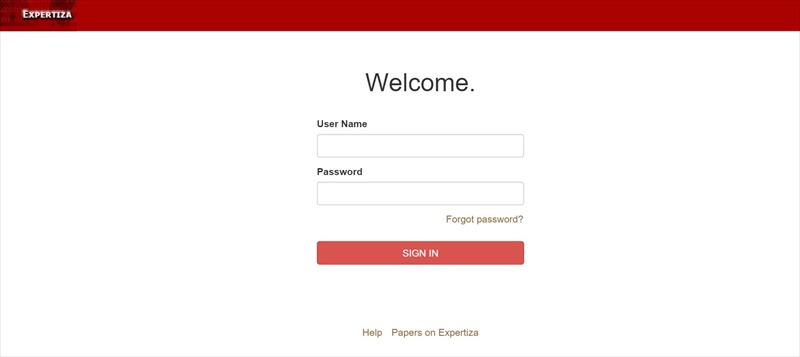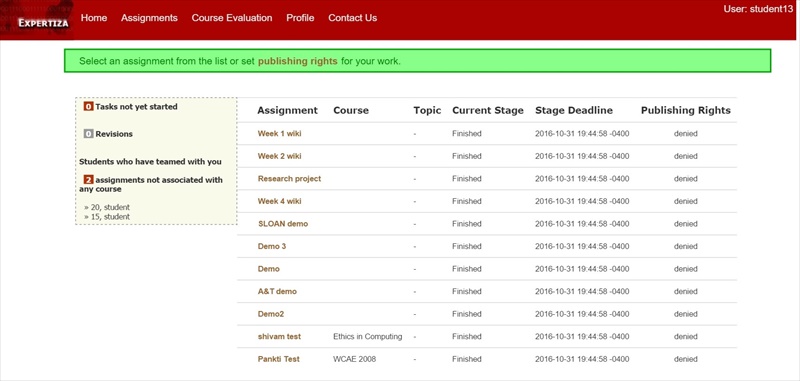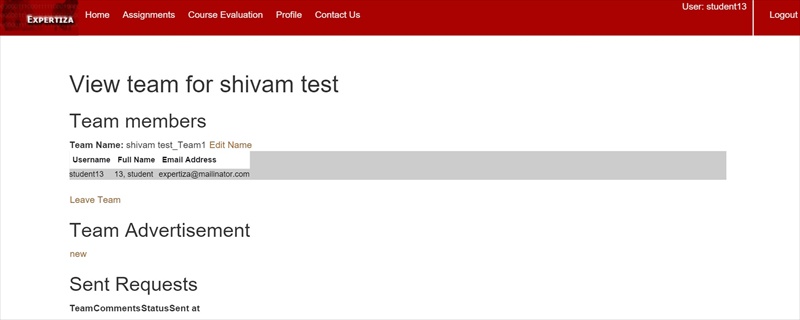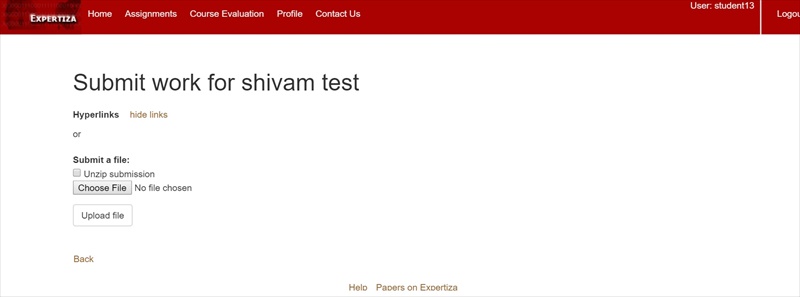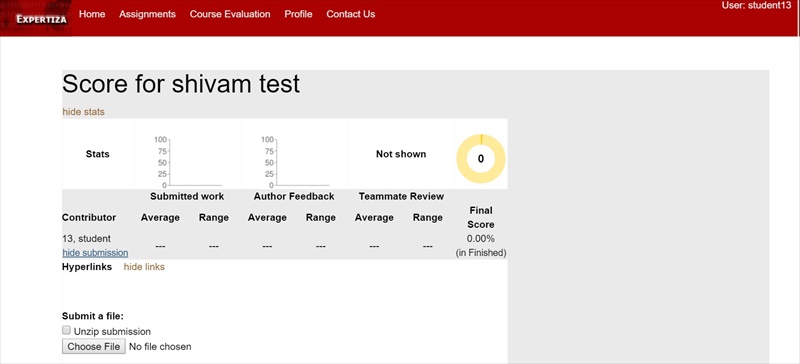CSC/ECE 517 Fall 2015/oss E1562 APS
E1562. Refactor AssignmentParticipant model<ref>Project Description document https://docs.google.com/document/d/1uWs3zyrupTmrOFuv5IbVWCF4NRvCXqJmg8dZ0wCqgus</ref>
This page provides a brief description of the Expertiza project. The project is aimed at refactoring the AssignmentParticipant model which is subclass of Participant model. This model is used to maintain the list of students/users participating in a given assignment. For any new or existing assignments, this model manages the entire list of users assigned to that particular assignment. It primarily includes method for scores calculations, assignment submission paths, reviews, etc. As part of this project, some of the methods have been removed which were not being used anywhere, some have been moved to their appropriate helper module and some have been refactored into smaller ones.
Introduction to Expertiza
Expertiza is a peer review based system which provides incremental learning from the class. This project has been developed together by faculty and students using Ruby on Rails framework. Expertiza allows the instructor to create, edit and delete assignments, create new assignment topics, assign them to a particular class or selected students, have students work on teams and then review each other's assignments at the end. For the students, they can signup for topics, form teams, and submit their projects and assignments. Students then review the work done by other students and give suggestions to improve. Teams after reviews are allotted scores and they can refer to the peer comments to further improve their work. It also supports submission of different file types for assignments, including the URLs and wiki pages.
Why refactoring?
Refactoring<ref>Refactoring https://en.wikipedia.org/wiki/Code_refactoring</ref> is restructuring of code without the need of changing any external behavior. It reduces complexity and improves readability. It also becomes easy to extend the application with respect to different modules and their functionalities. Some common techniques to refactor are:
- Moving methods to appropriate modules
- Breaking methods into more meaningful functionality
- Creating more generalized code.
- Renaming methods and variable.
- Inheritance
Project Description
Refactor AssignmentParticipant model which is a subclass of Participant model. The following tasks have been performed as per the requirements.
- Refactor scores method to smaller methods.
- In set_handle method, there is no need for a separate ELSEIF statement. Club the ELSEIF statement into IF statement as an another OR condition.
- Remove methods like compute_quiz_scores(scores) , average_score_per_assignment(assignment_id) which are not being used.
- Method cycle_deviation_score(cycle) is also present in CollusionCycle, remove it from this class.
- Methods related to reviews like teammate_reviews, bookmark_reviews do not belong to AssignmentParticipant model. Move them to the appropriate class.
- Methods related to files and directories like files(directory) should not be present in AssignmentParticipant model, move them to FileHelper module.
Refactoring
Scores method
The method scores has been converted to smaller methods scores, assignment_questionnaires, merge_scores, calculate_scores. It is a good practice to keep the methods not extremely long as they tend to complicate the functionality and the readability.
| Before | After |
|---|---|
def scores(questions)
scores = {}
scores[:participant] = self
self.assignment.questionnaires.each do |questionnaire|
round = AssignmentQuestionnaire.find_by_assignment_id_and_questionnaire_id(self.assignment.id, questionnaire.id).used_in_round
#create symbol for "varying rubrics" feature -Yang
if(round!=nil)
questionnaire_symbol = (questionnaire.symbol.to_s+round.to_s).to_sym
else
questionnaire_symbol = questionnaire.symbol
end
scores[questionnaire_symbol] = {}
if round==nil
scores[questionnaire_symbol][:assessments] = questionnaire.get_assessments_for(self)
else
scores[questionnaire_symbol][:assessments] = questionnaire.get_assessments_round_for(self,round)
end
scores[questionnaire_symbol][:scores] = Answer.compute_scores(scores[questionnaire_symbol][:assessments], questions[questionnaire_symbol])
end
scores[:total_score] = self.assignment.compute_total_score(scores) #merge scores[review#] (for each round) to score[review] -Yang
if self.assignment.varying_rubrics_by_round?
review_sym = "review".to_sym
scores[review_sym] = Hash.new
scores[review_sym][:assessments] = Array.new
scores[review_sym][:scores] = Hash.new
scores[review_sym][:scores][:max] = -999999999
scores[review_sym][:scores][:min] = 999999999
scores[review_sym][:scores][:avg] = 0
total_score = 0
for i in 1..self.assignment.get_review_rounds
round_sym = ("review"+i.to_s).to_sym
if scores[round_sym][:assessments].nil? || scores[round_sym][:assessments].length==0
next
end
length_of_assessments=scores[round_sym][:assessments].length.to_f
scores[review_sym][:assessments]+=scores[round_sym][:assessments] if(scores[round_sym][:scores][:max]!=nil && scores[review_sym][:scores][:max]<scores[round_sym][:scores][:max])
scores[review_sym][:scores][:max]= scores[round_sym][:scores][:max]
end
if(scores[round_sym][:scores][:min]!= nil && scores[review_sym][:scores][:min]>scores[round_sym][:scores][:min])
scores[review_sym][:scores][:min]= scores[round_sym][:scores][:min]
end
if(scores[round_sym][:scores][:avg]!=nil)
total_score += scores[round_sym][:scores][:avg]*length_of_assessments
end
end
if scores[review_sym][:scores][:max] == -999999999 && scores[review_sym][:scores][:min] == 999999999
scores[review_sym][:scores][:max] = 0
scores[review_sym][:scores][:min] = 0
end
scores[review_sym][:scores][:avg] = total_score/scores[review_sym][:assessments].length.to_f end # In the event that this is a microtask, we need to scale the score accordingly and record the total possible points
# PS: I don't like the fact that we are doing this here but it is difficult to make it work anywhere else
if assignment.is_microtask?
topic = SignUpTopic.find_by_assignment_id(assignment.id)
if !topic.nil?
scores[:total_score] *= (topic.micropayment.to_f / 100.to_f)
scores[:max_pts_available] = topic.micropayment
end
end
# for all quiz questionnaires (quizzes) taken by the participant
quiz_responses = Array.new
quiz_response_mappings = QuizResponseMap.where(reviewer_id: self.id)
quiz_response_mappings.each do |qmapping|
if (qmapping.response)
quiz_responses << qmapping.response
end
end
#scores[:quiz] = Hash.new
#scores[:quiz][:assessments] = quiz_responses
#scores[:quiz][:scores] = Answer.compute_quiz_scores(scores[:quiz][:assessments])
scores[:total_score] = assignment.compute_total_score(scores) #scores[:total_score] += compute_quiz_scores(scores) # move lots of calculation from view(_participant.html.erb) to model
if self.grade
scores[:total_score] = self.grade
else
total_score = scores[:total_score]
if total_score > 100
total_score = 100
end
scores[:total_score] = total_score
scores
end
end
|
def scores(questions)
scores = {}
scores[:participant] = self
assignment_questionnaires(questions, scores) scores[:total_score] = self.assignment.compute_total_score(scores) merge_scores(scores) # In the event that this is a microtask, we need to scale the score accordingly and record the total possible points
# PS: I don't like the fact that we are doing this here but it is difficult to make it work anywhere else
if assignment.is_microtask?
topic = SignUpTopic.find_by_assignment_id(assignment.id)
if !topic.nil?
scores[:total_score] *= (topic.micropayment.to_f / 100.to_f)
scores[:max_pts_available] = topic.micropayment
end
end
# for all quiz questionnaires (quizzes) taken by the participant
quiz_responses = Array.new
quiz_response_mappings = QuizResponseMap.where(reviewer_id: self.id)
quiz_response_mappings.each do |qmapping|
if (qmapping.response)
quiz_responses << qmapping.response
end
end
#scores[:quiz] = Hash.new
#scores[:quiz][:assessments] = quiz_responses
#scores[:quiz][:scores] = Answer.compute_quiz_scores(scores[:quiz][:assessments])
scores[:total_score] = assignment.compute_total_score(scores) #scores[:total_score] += compute_quiz_scores(scores) calculate_scores(scores) end
def assignment_questionnaires(questions, scores)
self.assignment.questionnaires.each do |questionnaire|
round = AssignmentQuestionnaire.find_by_assignment_id_and_questionnaire_id(self.assignment.id, questionnaire.id).used_in_round
#create symbol for "varying rubrics" feature -Yang
if(round!=nil)
questionnaire_symbol = (questionnaire.symbol.to_s+round.to_s).to_sym
else
questionnaire_symbol = questionnaire.symbol
end
scores[questionnaire_symbol] = {}
if round==nil
scores[questionnaire_symbol][:assessments] = questionnaire.get_assessments_for(self)
else
scores[questionnaire_symbol][:assessments] = questionnaire.get_assessments_round_for(self,round)
end
scores[questionnaire_symbol][:scores] = Answer.compute_scores(scores[questionnaire_symbol][:assessments], questions[questionnaire_symbol])
end
end
def merge_scores(scores)
#merge scores[review#] (for each round) to score[review] -Yang
if self.assignment.varying_rubrics_by_round?
review_sym = "review".to_sym
scores[review_sym] = Hash.new
scores[review_sym][:assessments] = Array.new
scores[review_sym][:scores] = Hash.new
scores[review_sym][:scores][:max] = -999999999
scores[review_sym][:scores][:min] = 999999999
scores[review_sym][:scores][:avg] = 0
total_score = 0
for i in 1..self.assignment.get_review_rounds
round_sym = ("review"+i.to_s).to_sym
if scores[round_sym][:assessments].nil? || scores[round_sym][:assessments].length==0
next
end
length_of_assessments=scores[round_sym][:assessments].length.to_f
scores[review_sym][:assessments]+=scores[round_sym][:assessments] if(scores[round_sym][:scores][:max]!=nil && scores[review_sym][:scores][:max]<scores[round_sym][:scores][:max])
scores[review_sym][:scores][:max]= scores[round_sym][:scores][:max]
end
if(scores[round_sym][:scores][:min]!= nil && scores[review_sym][:scores][:min]>scores[round_sym][:scores][:min])
scores[review_sym][:scores][:min]= scores[round_sym][:scores][:min]
end
if(scores[round_sym][:scores][:avg]!=nil)
total_score += scores[round_sym][:scores][:avg]*length_of_assessments
end
end
if scores[review_sym][:scores][:max] == -999999999 && scores[review_sym][:scores][:min] == 999999999
scores[review_sym][:scores][:max] = 0
scores[review_sym][:scores][:min] = 0
end
scores[review_sym][:scores][:avg] = total_score/scores[review_sym][:assessments].length.to_f end end
def calculate_scores(scores)
# move lots of calculation from view(_participant.html.erb) to model
if self.grade
scores[:total_score] = self.grade
else
total_score = scores[:total_score]
if total_score > 100
total_score = 100
end
scores[:total_score] = total_score
scores
end
end
|
set_handle method
The set_handle method had an unncessary ELSIF statement which was performing the same action self.handle = self.user.name. This has been clubbed as an OR condition to the IF statement and the first ELSIF statement has been removed.
| Before | After |
|---|---|
def set_handle
if self.user.handle == nil or self.user.handle == ""
self.handle = self.user.name
elsif AssignmentParticipant.where(parent_id: self.assignment.id, handle: self.user.handle).length > 0
self.handle = self.user.name
else
self.handle = self.user.handle
end
self.save!
end
|
def set_handle
if self.user.handle == nil or self.user.handle == "" or AssignmentParticipant.where(parent_id: self.assignment.id, handle: self.user.handle).length > 0
self.handle = self.user.name
else
self.handle = self.user.handle
end
self.save!
end
|
File and directory methods
The files and directory methods from AssignmentParticipant model have been moved to the FileHelper module. The methods files, submitted_files and dir_path are appropriate for the FileHelper' module and hence been moved there. The below line was added to the AssignmentParticipant model. include FileHelper
The AssignmentParticipant class would look like
class AssignmentParticipant < Participant require 'wiki_helper' include FileHelper
Methods moved to FileHelper:
- submitted_files
def submitted_files files(self.path) if self.directory_num end
- files(directory)
def files(directory) files_list = Dir[directory + "/*"] files = Array.new
files_list.each do |file|
if File.directory?(file)
dir_files = files(file)
dir_files.each{|f| files << f}
end
files << file
end
files
end
- submitted_files()
def submitted_files()
files = Array.new
if(self.directory_num)
files = files(self.path)
end
return files
end
- dir_path
def dir_path assignment.try :directory_path end
Remove unused methods
The following methods have been removed as they were not being used by the application.
def average_score_per_assignment(assignment_id)
def average_score_per_assignment(assignment_id) return 0 if self.response_maps.size == 0
sum_of_scores = 0
self.response_maps.metareview_response_maps.each do |metaresponse_map|
if !metaresponse_map.response.empty? && response_map == assignment_id then
sum_of_scores = sum_of_scores + response_map.response.last.average_score
end
end
(sum_of_scores / self.response_maps.size).to_i end
def quiz_taken_by?(contributor, reviewer)
def quiz_taken_by?(contributor, reviewer)
quiz_id = QuizQuestionnaire.find_by_instructor_id(contributor.id)
return QuizResponseMap.where(['reviewee_id = ? AND reviewer_id = ? AND reviewed_object_id = ?',
self.id, reviewer.id, quiz_id]).count > 0
end
def has_quiz?
def has_quiz? return !QuizQuestionnaire.find_by_instructor_id(self.id).nil? end
def reviewees
def reviewees
reviewees = []
rmaps = ResponseMap.all(conditions: ["reviewer_id = #{self.id} && type = 'ReviewResponseMap'"])
rmaps.each { |rm| reviewees.concat(AssignmentTeam.find(rm.reviewee_id).participants) }
reviewees end
def two_node_cycles
def two_node_cycles
cycles = []
self.reviewers.each do |ap|
if ap.reviewers.include?(self)
self.reviews_by_reviewer(ap).nil? ? next : s01 = self.reviews_by_reviewer(ap).get_total_score
ap.reviews_by_reviewer(self).nil? ? next : s10 = ap.reviews_by_reviewer(self).get_total_score
cycles.push([[self, s01], [ap, s10]])
end
end
cycles
end
def three_node_cycles
def three_node_cycles
cycles = []
self.reviewers.each do |ap1|
ap1.reviewers.each do |ap2|
if ap2.reviewers.include?(self)
self.reviews_by_reviewer(ap1).nil? ? next : s01 = self.reviews_by_reviewer(ap1).get_total_score
ap1.reviews_by_reviewer(ap2).nil? ? next : s12 = ap1.reviews_by_reviewer(ap2).get_total_score
ap2.reviews_by_reviewer(self).nil? ? next : s20 = ap2.reviews_by_reviewer(self).get_total_score
cycles.push([[self, s01], [ap1, s12], [ap2, s20]])
end
end
end
cycles
end
def four_node_cycles
def four_node_cycles
cycles = []
self.reviewers.each do |ap1|
ap1.reviewers.each do |ap2|
ap2.reviewers.each do |ap3|
if ap3.reviewers.include?(self)
self.reviews_by_reviewer(ap1).nil? ? next : s01 = self.reviews_by_reviewer(ap1).get_total_score
ap1.reviews_by_reviewer(ap2).nil? ? next : s12 = ap1.reviews_by_reviewer(ap2).get_total_score
ap2.reviews_by_reviewer(ap3).nil? ? next : s23 = ap2.reviews_by_reviewer(ap3).get_total_score
ap3.reviews_by_reviewer(self).nil? ? next : s30 = ap3.reviews_by_reviewer(self).get_total_score
cycles.push([[self, s01], [ap1, s12], [ap2, s23], [ap3, s30]])
end
end
end
end
cycles
end
def cycle_similarity_score(cycle)
def cycle_similarity_score(cycle) similarity_score = 0.0 count = 0.0
0 ... cycle.size-1.each do |pivot|
pivot_score = cycle[pivot][1]
similarity_score = similarity_score + (pivot_score - cycle[other][1]).abs
count = count + 1.0
end
similarity_score = similarity_score / count unless count == 0.0 similarity_score end
def cycle_deviation_score(cycle)
def cycle_deviation_score(cycle) deviation_score = 0.0 count = 0.0
0 ... cycle.size.each do |member|
participant = AssignmentParticipant.find(cycle[member][0].id)
total_score = participant.get_review_score
deviation_score = deviation_score + (total_score - cycle[member][1]).abs
count = count + 1.0
end
deviation_score = deviation_score / count unless count == 0.0 deviation_score end
def compute_quiz_scores(scores)
def compute_quiz_scores(scores)
total = 0
if scores[:quiz][:scores][:avg]
return scores[:quiz][:scores][:avg] * 100 / 100.to_f
else
return 0
end
return total
end
def review_response_maps
def review_response_maps
participant = Participant.find(id)
team_id = TeamsUser.team_id(participant.parent_id, participant.user_id)
ReviewResponseMap.where(reviewee_id: team_id, reviewed_object_id: assignment.id)
end
def members
def members team.try :participants end
def get_hash(time_stamp)
def get_hash(time_stamp) # first generate a hash from the assignment name itself hash_data = Digest::SHA1.digest(self.assignment.name.to_s)
# second generate a hash from the first hash plus the user name and time stamp
sign = hash_data + self.user.name.to_s + time_stamp.strftime("%Y-%m-%d %H:%M:%S")
Digest::SHA1.digest(sign)
end
Review methods
- The bookmark_reviews() method from AssignmentParticipant was being called once in get_assessments_for method of BookmarkRatingQuestionnaire class. It has been replaced by the method statement directly since it only had a single line of code.
| Before | After |
|---|---|
def bookmark_reviews
BookmarkRatingResponseMap.get_assessments_for(self) end |
def get_assessments_for(participant) BookmarkRatingResponseMap.get_assessments_for(participant) # participant.bookmark_reviews() end |
- The teammate_reviews() method from AssignmentParticipant was being called once in get_assessments_for method of TeammateReviewQuestionnaire class. It has been replaced by the method statement directly since it only had a single line of code.
| Before | After |
|---|---|
def teammate_reviews
TeammateReviewResponseMap.get_assessments_for(self) end |
def get_assessments_for(participant) TeammateReviewResponseMap.get_assessments_for(participant) #participant.teammate_reviews() end |
Testing
Please follow the below instruction to test UI:
- Login to Expertiza on http://152.46.20.199:3000/.
- Enter username as 'student13' and password as 'password'.
- You can select a previous assignment 'shivam test' or 'Pankti test'.
- You should be able to access the pages further
- Your team- The page content should be visible without any errors.
- Your work - The upload button for submission should be visible.
- Your scores- The page should give result 0 and not any error.
When the user runs the application, the behavior of the application remains the same.
The existing RSpec test cases remain successful. The same can be checked by running Rspec spec The participant is able to log in to the system, view the assignments, submit links and files in assignment submission, view the scores, review peers, etc. Below are some of the execution screenshots after the refactoring of the model.
The Expertiza Login Screen
User can see all the assignments as below.
View team members for the assignment selected. In this case, we have taken a dummy assignment we created.
View the submission page to upload the assignment.
View the scores of an assignment.
Resources
- Expertiza Github repository<ref>Expertiza Github repository https://github.com/expertiza/expertiza</ref>
- Our Github repository<ref>Our Github Repository https://github.com/shivamgulati1991/expertiza]</ref>
References
<references/>
